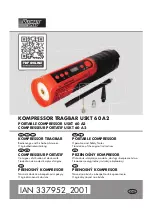
5
• Keep your hair, clothing, and gloves away from moving
parts. Loose clothes, jewellery, or long hair can be
caught in moving parts.
• Air vents may cover moving parts and should be
avoided as well.
WARNING
Risk of Burn
WARNING
Do not operate the portable compressor
with the doors or enclosures open!
WARNING
Do not open the cock before the air hose is
attached!
WHAT CAN HAPPEN
Contact with hot parts such as the compressor head or
outlet tubes could result in a serious skin burn.
HOW TO PREVENT IT
• Never touch hot components during or immediately
after operation of the compressor. Do not reach around
protective shrouds or attempt maintenance until unit
has been allowed to cool.
• The handling and lifting: hold the handle only when
move or transport the compressor.
• To avoid injuring, do not touch the cylinder, cylinder
head or exhaust hose and other over-heated parts
when the compressor is in use or shuts off within one
hour.
WARNING
Transport
a The maximum bevel during traction is at least 30°.
b Do not apply vehicles for traction.
c Do not place compressor under inflammable, explosive
or erosive service.
GLOSSARY
CFM: Cubic feet per minute.
SCFM: Standard cubic feet per minute; a unit of measure
of air delivery.
PSIG: Pounds per square inch gauge; a unit of measure
of pressure.
CUT-IN PRESSURE: While the motor is off, air tank
pressure drops as you continue to use your accessory or
air tool. When the tank pressure drops to a certain level
the motor will restart automatically. This is called “cut-in
pressure”.
CUT-OUT PRESSURE: When you turn on your air
compressor, it begins to run, air pressure in the air tank
begins to build. It builds to a certain pressure before the
motor automatically shuts off - protecting your air tank
from pressure higher than its design rating. The pressure
at which the motor shuts off is called “cut-out pressure”.
DUTY CYCLE
All Makita manufactured air compressors are
recommended to be operated at no more than a 50% duty
cycle. This means an air compressor that pumps air more
than 50% of one hour is considered misuse because the
air compressor is undersized for the required air demand.
GENERAL INFORMATION
This air compressor is equipped with an Oil-Less pump
designed for durability and no maintenance.
The compressor can be used for properly rated pneumatic
nailers and staplers. An air pressure regulator is supplied
for these applications.
WARNING:
Never use compressor for applications other than to
operate a properly rated nailer or stapler. Use of the
compressor for other applications could result in property
damage and personal injury.
Separate air filter regulators combine the functions of air
regulation and/or moisture and dirt removal should be
used where applicable.
ON-RECEIPT INSPECTION
DAMAGE: Each air compressor outfit is carefully tested
and checked before shipment. With improper handling,
damage may result in transit and cause problems with
compressor operation.
Immediately upon arrival, check equipment for both
concealed and visible damages to avoid expenses being
incurred to correct such problems. This should be done
regardless of any visible signs of damage to the shipping
container. If this product was shipped directly to you,
report any damages to the carrier and arrange for
inspection of goods immediately.
STORAGE
Before you store the air compressor, make sure you do
the following:
1. Review the “Maintenance” and “Operating
Procedures” sections and perform maintenance as
necessary. Be sure to drain water from the air tank.
2. Protect the electrical cord and air hose from damage
(such as being stepped on or run over).
Store the air compressor in a clean and dry location.
DESCRIPTION OF OPERATION
DRAIN VALVE: The drain valve is located at the bottom of
the air tank and is used to drain condensation from the
tank at the end of each use or daily.
THERMAL CIRCUIT BREAKER:
The electric motor has a manual reset thermal circuit
breaker. If the motor overheats for any reason, the circuit
breaker will shut off the motor. Turn pressure switch to the
“off” position and wait for unit to cool before pushing the
reset button and restarting the compressor.






































